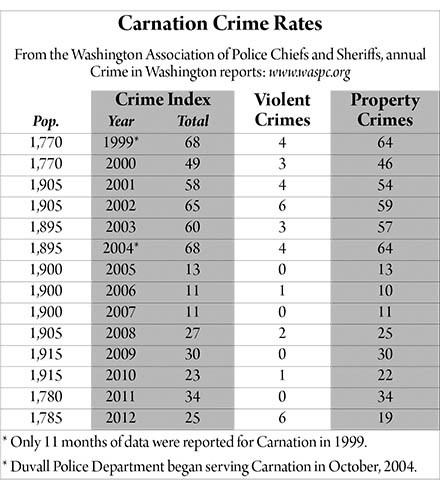Carnation officials were notified last Friday, June 28, that their contract for police services with Duvall might be ending this year.
The Duvall City Council voted unanimously Thursday, June 27, to drop the current contract, a reduced version of the agreement that’s connected the two cities for nine years.
Mayor Will Ibershof sent the termination letter the following day.
The contract, which gives Carnation roughly half-time police coverage by two Duvall Police Department officers and a quarter-time position for an administrator at a cost of $453,883, expires Dec. 31, 2013. Any city wanting out of it had to notify the other by July 1.
Duvall’s action doesn’t necessarily mark the end of the cities’ partnership, however.
“Basically, they would like to renegotiate portions of that existing agreement,” Carnation City Manager Ken Carter explained to his council at their July 2 meeting. The contract was written so that a renegotiation of terms required the old contract to be terminated, he said, “and they have done that.”
The current contract provides Carnation with two of Duvall’s 13-officer force, for 12 hours a day.
As Ibershof puts it, Duvall’s current 12-hour police deal with Carnation isn’t working for either city.
“A lot of it has to do with boots on the street,” the mayor said. Criminals, he said, have figured out that police are only in town 50 percent of the time.
For eight years, the original contract, 18 hours a day spread across three officers, “worked completely well for both cities,” said Ibershof.
But, he added, “Crime knows no hours.” Police still responded during off-hours, but increasing calls drew officers south down Highway 203.
“The dilemma that came up is it left Duvall uncovered,” said Ibershof, who told the Record that crime statistics changed.
In a June 20 letter briefing the Duvall City Council on the contract situation, he noted that Carnation has seen an increase from 52 to 237 after-hours calls under the reduced-hours contract.
Ibershof stated that Duvall’s police sergeants have expressed concerns that criminals as well as Carnation citizens know about the gaps in coverage, making it difficult to be proactive.
“The impact goes beyond the borders of both cities,” Ibershof stated in his letter. “One item stood out for me, the increased liability of Duvall…. The only way to continue providing service to Carnation is for Carnation to increase its service hours to the original amount… If Carnation does not choose to increase the hours, then Duvall needs to pass on a future agreement and focus its efforts on our growing community and its various needs.”
“If the city of Carnation is willing to renegotiate with us, returning to the same levels of service, we can make something work,” Ibershof said.
Carnation’s side
Carnation is willing to renegotiate, as discussed in the July 2 meeting of the Carnation City Council. But Carnation is also surprised by the action, and considering its options.
Mayor Jim Berger told the council, “After thinking about it for a couple of days… I think it’s a real good opportunity… to step back, look at our relationship with Duvall, … look at the things that are good about the police service that we get, look at the things we might wish to change in the police service that we get, and looking to see if there are other options.”
Those other options could include contracting with a different police department or the King County Sheriff’s department for service and putting a levy on the ballot for voters to fund the increased coverage from Duvall.
Any continuation of service with Duvall, though, would have to address Carnation’s own concerns and Carter told the council. “There’s a lot of frustration on our part,” he said.
Some of the frustration stemmed from a list of concerns that Ibershof shared with both councils in his recommendation to renegotiate the contract. These included the distance between the two towns, that officers don’t feel safe in Carnation, that one was hired to work in Carnation, but prefers Duvall, that it’s difficult to motivate officers to come to Carnation, and “they feel the only way it will work (is) if we have 24/7 coverage in Carnation.”
Carter, Berger and Fred Bereswill have met several times in recent months with Duvall officials to discuss police concerns, Carter said, and after each meeting, he thought all had agreed that the issues could be resolved fairly easily, such as by adjusting officer schedules to limit potential vulnerability in Duvall. But the issues continue to come up. At another meeting with the Duvall council, Carter said “They were somehow under the impression that we were wanting a further reduction of service…. which was not true.”
In fact, Carter said the city is already budgeting for the additional costs of police salaries and expenses for 2014, and believes the shared police department is a win for both cities.
Carnation began contracting for police services from Duvall in late 2004. The original contract called for three officers, covering the city for 18 hours a day. The city’s crime rate dropped dramatically with the change, but police costs rose steadily, and the city asked voters to approve levy lid lift increases for police in 2008, 2009, and 2011. Each attempt failed, and in 2011, the city council voted to cut police services for the 2012-13 contract.
A revised contract, retroactive to Jan. 1, was adopted by the Carnation City Council March 6, 2012, and by the Duvall Council March 22.



